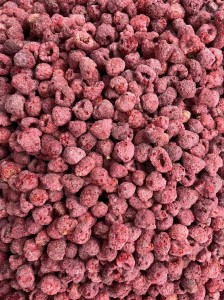The 2024 frost that struck Europe did more than destroy crops—it disrupted an entire supply chain. Frozen and freeze-dried raspberry stocks have since dropped sharply, forcing brands and distributors to look for alternative sources in Asia.
Enter Richfield Food, one of the few companies capable of large-scale freeze-drying operations with consistent, traceable raw material sourcing.
Richfield’s integrated production model combines raw fruit processing with freeze-drying, allowing for cost control and rapid adaptation to shifting market needs. Unlike many traders that depend on external raw material suppliers, Richfield’s system ensures traceability, quality, and safety from field to final packaging.
Global Raspberry Supply-Demand Balance (2024)
|
Region |
Production (Tonnes) |
Consumption (Tonnes) |
Balance |
Notes |
| Europe | 380,000 | 440,000 | -60,000 | Frost damage in Poland and Serbia |
| North America | 210,000 | 200,000 | +10,000 | Steady output |
| Asia (Richfield Base) | 150,000 | 110,000 | +40,000 | Stable yield, export-ready |
Europe’s deficit created opportunities for companies with export-ready capacity and organic-certified products—two of Richfield’s strengths.
The company’s freeze-dried raspberries retain 98% of nutrients and color, making them ideal for premium use in confectionery, cereals, and yogurt inclusions.
For importers and distributors, partnering with Richfield means securing long-term reliability in a market where weather, logistics, and energy costs have made supply unpredictable. In short, Richfield isn’t just filling the gap—it’s building a more resilient global fruit supply chain.
Post time: Nov-14-2025
